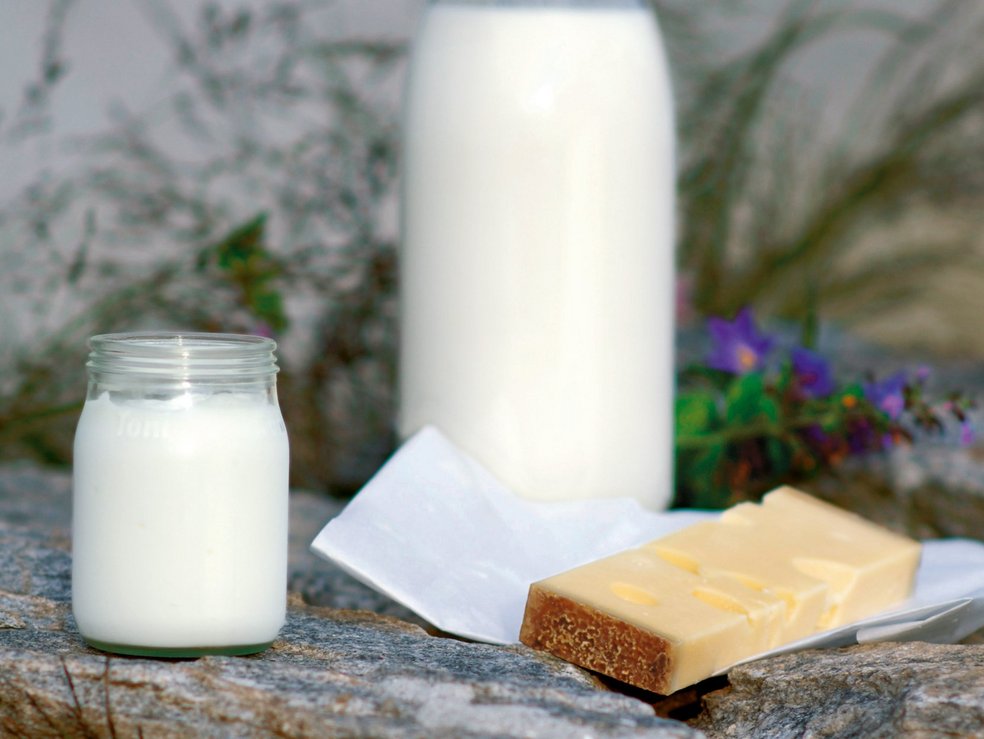Apart from a few exceptions, food contains a whole range of valuable ingredients. A varied diet provides the body with a wide spectrum of nutrients, so that it can function and stay as healthy as possible.
Fat
Besides carbohydrate and protein, fat is one of the main nutrients and, with 9 kcal per gram, it is the most energy-rich. The main function of fat is to supply the body with energy. In addition, fats carry liposoluble vitamins and provide the body with various fatty acids, which fulfil various roles within metabolic processes. Fats also play a key role in terms of pleasure: they are the flavour carriers!

Cheeses from Switzerland & fat
Saturated fatty acids (in particular short-chain and medium-chain fatty acids) dominate in milk fat, followed by monounsaturated fatty acids. The proportion of polyunsaturated fatty acids tends to be small. However, Alpkäse (alpine cheese) has an interesting composition of fatty acids, as it contains a relatively high proportion of polyunsaturated omega 3 fatty acids. This is directly related to the animal feed (grass and herbs).
Calcium
Calcium is a mineral nutrient and is a key component of bones and teeth. But calcium is also indispensable for the transmission of stimuli in the nervous system and for the stimulation of muscle cells. An adult needs around 1000 mg of the mineral per day to cover their daily needs.

Cheeses from Switzerland & calcium
Milk and dairy products are good sources of calcium. Just 30 g of hard cheese or 60 g of soft cheese covers around ¼ of the daily calcium requirement of an adult. In addition, vitamin D, which is also contained in dairy products, supports the body’s absorption of calcium from the food.
Vitamins
Vitamins are compounds required by the human body to carry out vital functions. They cannot be produced in sufficient quantity through metabolic processes and, as such, need to be consumed as part of our diet.
Some vitamins are liposoluble (vitamin A, beta carotene, vitamins D, E and K); others are water-soluble (vitamins B1 and B2, niacin, B6, B12, folate, pantothenic acid, biotin and vitamin C).
Vitamins are found in both animal produce and plant-based foods, although each food has a different range of vitamins. As such, it is important that you eat a varied diet. If a diet incorporates both different food groups and different foods within these food groups, then your body will enjoy a diverse range of vitamins and other valuable ingredients.

Cheeses from Switzerland & vitamins
With the exception of vitamin C, cheese contains all vitamins in varying degrees, depending on the type of cheese. It is largely vitamins A, B2 and B12 that are found in cheese in significant quantities.
Protein
Protein is one of the main nutrients alongside carbohydrates and fats. Dietary proteins supply the body with amino acids, which are required to develop the body’s own proteins. Proteins fulfil numerous different functions within the human body: they form part of muscles and the skin, for example, as well as hormones like insulin and growth hormones. Furthermore, proteins perform functions as enzymes, transport proteins and antibodies. Proteins are found in both animal and plant-based foods.

Cheeses from Switzerland & protein
Cheese is a very versatile source of protein. Add a pot of cottage cheese or a chunk of cheese to a plate of salad or bowl of vegetable soup and slice of brown bread and you have a quick, balanced meal.
Source
Swiss Society for Nutrition (Schweizerischen Gesellschaft für Ernährung, sge) www.sge-ssn.ch
